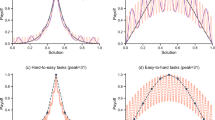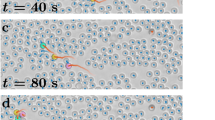Abstract
Groups coordinate more effectively when individuals are able to learn from others’ successes. But acquiring such knowledge is not always easy, especially in real-world environments where success is hidden from public view. We suggest that social inference capacities may help bridge this gap, allowing individuals to update their beliefs about others’ underlying knowledge and success from observable trajectories of behaviour. We compared our social inference model against simpler heuristics in three studies of human behaviour in a collective-sensing task. Experiment 1 demonstrated that average performance improved as a function of group size at a rate greater than predicted by heuristic models. Experiment 2 introduced artificial agents to evaluate how individuals selectively rely on social information. Experiment 3 generalized these findings to a more complex reward landscape. Taken together, our findings provide insight into the relationship between individual social cognition and the flexibility of collective behaviour.
This is a preview of subscription content, access via your institution
Access options
Access Nature and 54 other Nature Portfolio journals
Get Nature+, our best-value online-access subscription
$29.99 / 30 days
cancel any time
Subscribe to this journal
Receive 12 digital issues and online access to articles
$119.00 per year
only $9.92 per issue
Buy this article
- Purchase on Springer Link
- Instant access to full article PDF
Prices may be subject to local taxes which are calculated during checkout






Similar content being viewed by others
Data availability
All data are available at https://github.com/hawkrobe/emergent-sensing.
Code availability
All experiment and analysis code are available at https://github.com/hawkrobe/emergent-sensing.
References
Laland, K. N. Social learning strategies. Learn. Behav. 32, 4–14 (2004).
Hoppitt, W. & Laland, K. N. Social Learning: An Introduction to Mechanisms, Methods, and Models (Princeton Univ. Press, 2013).
Rendell, L. et al. Cognitive culture: theoretical and empirical insights into social learning strategies. Trends Cogn. Sci. 15, 68–76 (2011).
Molleman, L., Van den Berg, P. & Weissing, F. J. Consistent individual differences in human social learning strategies. Nat. Commun. 5, 3570 (2014).
Canteloup, C., Hoppitt, W. & van de Waal, E. Wild primates copy higher-ranked individuals in a social transmission experiment. Nat. Commun. 11, 459 (2020).
Laland, K. N. Darwin’s Unfinished Symphony (Princeton Univ. Press, 2017).
Rogers, A. R. Does biology constrain culture? Am. Anthropol. 90, 819–831 (1988).
Kameda, T. & Nakanishi, D. Does social/cultural learning increase human adaptability? Rogers’s question revisited. Evol. Hum. Behav. 24, 242–260 (2003).
Boyd, R. & Richerson, P. J. Why does culture increase human adaptability? Ethol. Sociobiol. 16, 125–143 (1995).
Kendal, R. L., Coolen, I., van Bergen, Y. & Laland, K. N. Trade-offs in the adaptive use of social and asocial learning. Adv. Study Behav. 35, 333–379 (2005).
Heyes, C. Blackboxing: social learning strategies and cultural evolution. Phil. Trans. R. Soc. B 371, 20150369 (2016).
Kendal, R. L. et al. Social learning strategies: bridge-building between fields. Trends Cogn. Sci. 22, 651–665 (2018).
McElreath, R. et al. Beyond existence and aiming outside the laboratory: estimating frequency-dependent and pay-off-biased social learning strategies. Phil. Trans. R. Soc. B 363, 3515–3528 (2008).
Deffner, D., Kleinow, V. & McElreath, R. Dynamic social learning in temporally and spatially variable environments. R. Soc. Open Sci. 7, 200734 (2020).
Najar, A., Bonnet, E., Bahrami, B. & Palminteri, S. The actions of others act as a pseudo-reward to drive imitation in the context of social reinforcement learning. PLoS Biol. 18, e3001028 (2020).
Toyokawa, W., Whalen, A. & Laland, K. N. Social learning strategies regulate the wisdom and madness of interactive crowds. Nat. Hum. Behav. 3, 183–193 (2019).
Heyes, C. Who knows? Metacognitive social learning strategies. Trends Cogn. Sci. 20, 204–213 (2016).
Shafto, P., Goodman, N. D. & Frank, M. C. Learning from others: the consequences of psychological reasoning for human learning. Perspect. Psychol. Sci. 7, 341–351 (2012).
Behrens, T. E., Hunt, L. T., Woolrich, M. W. & Rushworth, M. F. Associative learning of social value. Nature 456, 245–249 (2008).
Heyes, C. What’s social about social learning? J. Comp. Psychol. 126, 193–202 (2012).
Heyes, C. Simple minds: a qualified defence of associative learning. Phil. Trans. R. Soc. B 367, 2695–2703 (2012).
Woolley, A. W., Chabris, C. F., Pentland, A., Hashmi, N. & Malone, T. W. Evidence for a collective intelligence factor in the performance of human groups. Science 330, 686–688 (2010).
Engel, D., Woolley, A. W., Jing, L. X., Chabris, C. F. & Malone, T. W. Reading the mind in the eyes or reading between the lines? Theory of mind predicts collective intelligence equally well online and face-to-face. PLoS ONE 9, e115212 (2014).
Schlag, K. H. Why imitate, and if so, how? A boundedly rational approach to multi-armed bandits. J. Econ. Theory 78, 130–156 (1998).
Lazer, D. & Friedman, A. The network structure of exploration and exploitation. Adm. Sci. Q. 52, 667–694 (2007).
Rendell, L. et al. Why copy others? Insights from the social learning strategies tournament. Science 328, 208–213 (2010).
Mason, W., Jones, A. & Goldstone, R. L. Propagation of innovations in networked groups. J. Exp. Psychol. 137, 422 (2008).
Mesoudi, A. An experimental simulation of the ‘copy-successful-individuals’ cultural learning strategy: adaptive landscapes, producer–scrounger dynamics, and informational access costs. Evol. Hum. Behav. 29, 350–363 (2008).
Mason, W. & Watts, D. J. Collaborative learning in networks. Proc. Natl Acad. Sci. USA 109, 764–769 (2012).
Derex, M., Beugin, M.-P., Godelle, B. & Raymond, M. Experimental evidence for the influence of group size on cultural complexity. Nature 503, 389–391 (2013).
Wegner, D. M. in Theories of Group Behavior (eds Mullen, B. & Goethals, G. R.) 185–208 (Springer, 1987).
Peltokorpi, V. & Hood, A. C. Communication in theory and research on transactive memory systems: a literature review. Top. Cogn. Sci. 11, 644–667 (2019).
Wisdom, T. N., Song, X. & Goldstone, R. L. Social learning strategies in networked groups. Cogn. Sci. 37, 1383–1425 (2013).
Baker, C. L., Jara-Ettinger, J., Saxe, R. & Tenenbaum, J. B. Rational quantitative attribution of beliefs, desires and percepts in human mentalizing. Nat. Hum. Behav. 1, 0064 (2017).
Jara-Ettinger, J., Gweon, H., Schulz, L. E. & Tenenbaum, J. B. The naïve utility calculus: computational principles underlying commonsense psychology. Trends Cogn. Sci. 20, 589–604 (2016).
Wood, L. A., Kendal, R. L. & Flynn, E. G. Whom do children copy? Model-based biases in social learning. Dev. Rev. 33, 341–356 (2013).
Sobel, D. M. & Kushnir, T. Knowledge matters: how children evaluate the reliability of testimony as a process of rational inference. Psychol. Rev. 120, 779 (2013).
Poulin-Dubois, D. & Brosseau-Liard, P. The developmental origins of selective social learning. Curr. Dir. Psychol. Sci. 25, 60–64 (2016).
Mills, C. M. & Landrum, A. R. Learning who knows what: children adjust their inquiry to gather information from others. Front. Psychol. 7, 951 (2016).
Hawthorne-Madell, D. & Goodman, N. D. Reasoning about social sources to learn from actions and outcomes. Decision 6, 17 (2019).
Vélez, N. & Gweon, H. Integrating incomplete information with imperfect advice. Top. Cogn. Sci. 11, 299–315 (2019).
Whalen, A., Griffiths, T. L. & Buchsbaum, D. Sensitivity to shared information in social learning. Cogn. Sci. 42, 168–187 (2018).
Almaatouq, A., Alsobay, M., Yin, M. & Watts, D. J. Task complexity moderates group synergy. Proc. Natl Acad. Sci. USA 118, e2101062118 (2021).
Almaatouq, A. et al. Beyond playing 20 questions with nature: integrative experiment design in the social and behavioral sciences. Behav. Brain Sci. https://doi.org/10.1017/S0140525X22002874 (2022).
Berdahl, A. et al. Collective animal navigation and migratory culture: from theoretical models to empirical evidence. Phil. Trans. R. Soc. B 373, 20170009 (2018).
Dechaume-Moncharmont, F.-X. et al. The hidden cost of information in collective foraging. Proc. R. Soc. B 272, 1689–1695 (2005).
Goldstone, R. L., Ashpole, B. C. & Roberts, M. E. Knowledge of resources and competitors in human foraging. Psychon. Bull. Rev. 12, 81–87 (2005).
Berdahl, A., Torney, C. J., Ioannou, C. C., Faria, J. J. & Couzin, I. D. Emergent sensing of complex environments by mobile animal groups. Science 339, 574–576 (2013).
Bikhchandani, S., Hirshleifer, D. & Welch, I. Learning from the behavior of others: conformity, fads, and informational cascades. J. Econ. Perspect. 12, 151–170 (1998).
Anderson, L. R. & Holt, C. A. Information cascades in the laboratory. Am. Econ. Rev. 87, 847–862 (1997).
Pérez-Escudero, A. & de Polavieja, G. G. Collective animal behavior from Bayesian estimation and probability matching. PLoS Comput. Biol. 7, e1002282 (2011).
Karpas, E. D., Shklarsh, A. & Schneidman, E. Information socialtaxis and efficient collective behavior emerging in groups of information-seeking agents. Proc. Natl Acad. Sci. USA 114, 5589–5594 (2017).
Mann, R. P. Collective decision-making by rational individuals. Proc. Natl Acad. Sci. USA 115, E10387–E10396 (2018).
Mann, R. P. Collective decision-making by rational agents with differing preferences. Proc. Natl Acad. Sci 117, 10388–10396 (2020).
Hein, A. M. et al. The evolution of distributed sensing and collective computation in animal populations. eLife 4, e10955 (2015).
Torney, C. J., Berdahl, A. & Couzin, I. D. Signalling and the evolution of cooperative foraging in dynamic environments. PLoS Comput. Biol. 7, e1002194 (2011).
Brown, C. R. Social foraging in cliff swallows: local enhancement, risk sensitivity, competition and the avoidance of predators. Anim. Behav. 36, 780–792 (1988).
Brown, C. R., Brown, M. B. & Shaffer, M. L. Food-sharing signals among socially foraging cliff swallows. Anim. Behav. 42, 551–564 (1991).
Hawkins, R. D. Conducting real-time multiplayer experiments on the web. Behav. Res. Methods 47, 966–976 (2014).
Acknowledgements
A preliminary version of our work reporting experiment 3 appeared at the 2015 Annual Conference of the Cognitive Science Society. This work was supported by the Center for Minds, Brains and Machines (CBMM), funded by NSF STC award CCF-1231216, and NSF Graduate Research Fellowships under grant number 1122374 to P.M.K. and grant number DGE-114747 to R.D.H. Any opinion, findings, and conclusions or recommendations expressed in this material are those of the authors and do not necessarily reflect the views of the National Science Foundation. The funders had no role in study design, data collection and analysis, decision to publish or preparation of the manuscript. A.M.B. was supported by the H. Mason Keeler Endowed Professorship in Sports Fisheries Management. Special thanks to C. Torney for providing the code to make the score field gradients, to H. Fang for assisting with analyses and to R. Goldstone for helpful feedback on the interpretation of our results.
Author information
Authors and Affiliations
Contributions
R.D.H., P.M.K., A.P., N.D.G. and J.B.T. formulated the study. R.D.H. and P.M.K. designed the experiments, implemented the experiments and analysed the data. R.D.H., P.M.K. and A.M.B. wrote the paper. All authors gave final approval for publication and agree to be held accountable for the work performed therein.
Corresponding author
Ethics declarations
Competing interests
The authors declare no competing interests.
Peer review
Peer review information
Nature Human Behaviour thanks Wataru Toyokawa and the other, anonymous, reviewer(s) for their contribution to the peer review of this work. Peer reviewer reports are available.
Additional information
Publisher’s note Springer Nature remains neutral with regard to jurisdictional claims in published maps and institutional affiliations.
Supplementary information
Rights and permissions
Springer Nature or its licensor (e.g. a society or other partner) holds exclusive rights to this article under a publishing agreement with the author(s) or other rightsholder(s); author self-archiving of the accepted manuscript version of this article is solely governed by the terms of such publishing agreement and applicable law.
About this article
Cite this article
Hawkins, R.D., Berdahl, A.M., Pentland, A.‘. et al. Flexible social inference facilitates targeted social learning when rewards are not observable. Nat Hum Behav 7, 1767–1776 (2023). https://doi.org/10.1038/s41562-023-01682-x
Received:
Accepted:
Published:
Issue Date:
DOI: https://doi.org/10.1038/s41562-023-01682-x
This article is cited by
-
Collective incentives reduce over-exploitation of social information in unconstrained human groups
Nature Communications (2024)
-
Collective cognition and behaviour
Nature Human Behaviour (2023)



